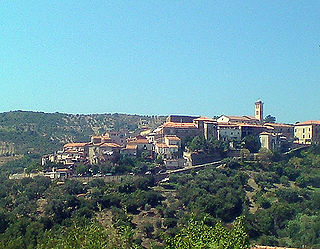
Casal Velino, also spelled Casalvelino, is a town and comune in the province of Salerno in the Campania region of south-western Italy.
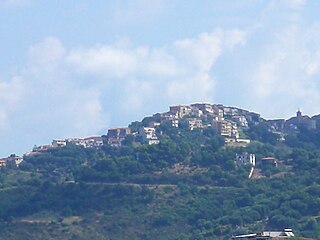
Centola is a town and comune in the province of Salerno in the Campania region of south-western Italy.

Magliano Vetere is a town and comune in the province of Salerno in the Campania region of south-western Italy. As of 2011 its population was 739.

Omignano is a town and comune in the province of Salerno in the Campania region of south-western Italy.

Polla is a town and comune of the province of Salerno in the Campania region of south-west Italy. In 2011 its population was 5,327.
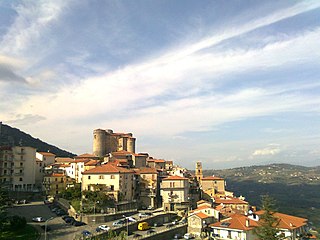
Roccadaspide is a town and comune in the province of Salerno in the Campania region of south-western Italy.

Salento is a town and comune in the Cilento area, province of Salerno, in the Campania region of south-western Italy.

San Mauro Cilento is a town and comune in the province of Salerno in the Campania region of south-western Italy.

Sapri is a town and comune in the province of Salerno in the Campania region of south-western Italy. It is one of the southernmost towns of the region of Cilento and its population is 6,783.

Vallo della Lucania is a town and comune in the province of Salerno in the Campania region of south-western Italy. It lies in the middle of Cilento and its population is 8,680.

Trentinara is a town and comune near Paestum in the province of Salerno in the Campania region of south-western Italy.
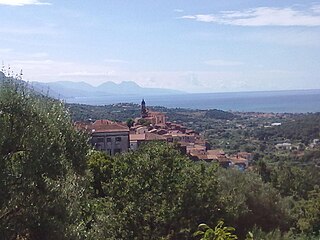
Vibonati is a town and comune in the province of Salerno in the Campania region of south-western Italy.

Padula is a comune in the province of Salerno in the Campania region of south-western Italy. It is the home of the Carthusian monastery Certosa di San Lorenzo, sometimes referred to as the Certosa di Padula. As of 2011 its population was of 5,279.
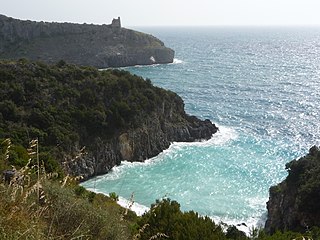
Cilento is an Italian geographical region of Campania in the central and southern part of the province of Salerno and an important tourist area of southern Italy.
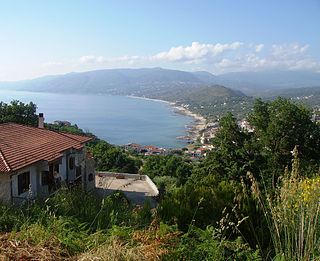
Palinuro is an Italian small town, the most populated civil parish (frazione) of Centola, Province of Salerno, in the Campania region. The name of the town is derived from Palinurus, the helmsman of Aeneas, as recorded in the fifth and sixth books of the Aeneid.

Piano Vetrale, also shortened as Vetrale or Piano, is a southern Italian village and hamlet (frazione) of Orria, a municipality in the province of Salerno, Campania. As of 2011, its population was of 475.

Franco Loi was an Italian poet, writer, and essayist. He was born in Genoa, and died in Milan, aged 90. He made his debut in 1973 as a poet using dialect and had a good success with the work I cart, and the following year, 1974, with Poems of love. In 1975, the poet proved to have reached complete maturity of expression with the poem Stròlegh, published by Einaudi with a preface by Franco Fortini.
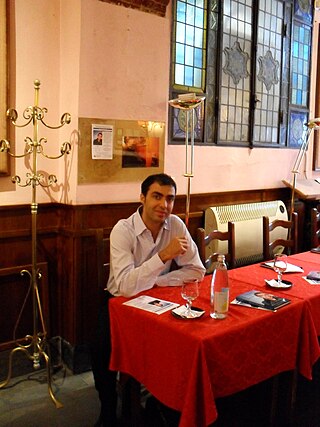
Menotti Augusto Serse Lerro is an Italian poet, writer, playwright, librettist and Anglicist academic. His work explores matters of social alienation and existentialism, the physicality and vulnerability of the body, the interpretation of memories, the meaning of objects and the philosophical importance of human identity. In 2015 he published Donna Giovanna, l'ingannatrice di Salerno, a feminized bisexual version of the mythical figure of Don Juan, El Burlador de Sevilla. In 2018 he wrote Il Dottor Faust, an original version of the character of Faust. In addition he is the author of a New Manifesto of Arts and the founder of the Empathic movement (Empathism) that arose in the South of Italy at the beginning of 2020.

Cilento International Poetry Prize is an Italian literary prize founded in 2017 by the poet, writer and literary critic Menotti Lerro and awarded annually, in the month of August, in Salento Cilento—"The Poetry Village".

The Empathic Movement is a literary, artistic, philosophical and cultural movement founded in the South of Italy in 2020 within the 'New Cultural Triangle of Ancient Cilento': Omignano - "The Aphorisms Village", Salento - "The Poetry Village", Vallo della Lucania - "Seat of Contemporary Arts Centre". From this first Triangle the Cultural Pyramid of Cilento was born to represent the enlarged epicenter of the Movement with 25 villages involved which joined with a new cultural identity and signing a protocol agreement.




















